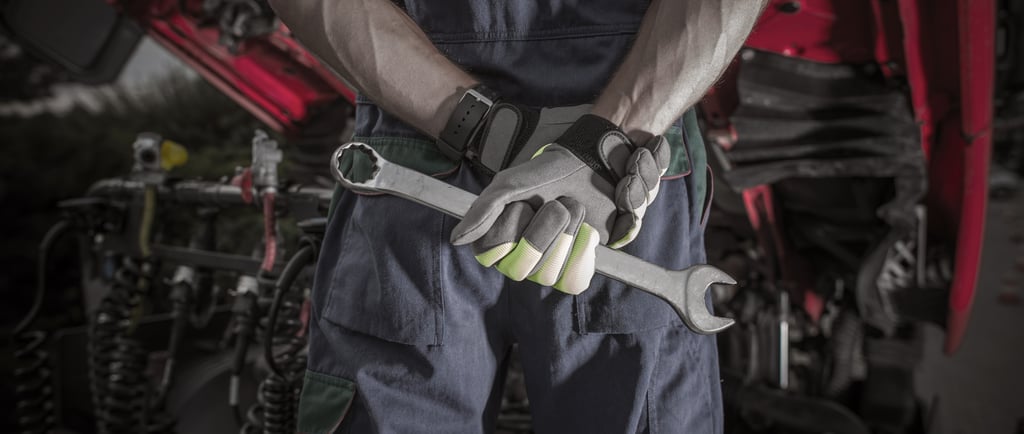How to Find the Right Heavy Duty Repair Shop: A Fleet Manager’s Guide
Looking for a reliable heavy duty repair shop? Learn how to spot red flags, avoid costly mistakes, and choose the right partner for your fleet. Plus, why we trust Truck Service Point for quality repairs done right.
5/2/20254 min read


When a truck in your fleet breaks down, the clock starts ticking. Every minute off the road can mean lost revenue, missed deadlines, and unhappy clients. With over 47,000 heavy-duty repair businesses across the U.S. , choosing the right repair shop can be daunting. How do you know which heavy duty repair shop is reliable and which will leave you with more headaches than you started with?
Our team came together with this guide for fleet managers to understand how to find the right heavy duty repair shop for them. We'll cover everything from the hidden risks of working with the wrong shop, to key factors to consider when looking for the right one.
Why Choosing the Right Shop Matters
Sending your vehicle to the wrong shop can cost you far more than just the bill. According to FleetNet America, the average mechanical repair now costs $644 per incident. But inflated bills from the wrong provider or shoddy repairs can push that number well over $2,000, especially in emergency situations.
Choosing the wrong shop can have a number of different negative impacts on your fleet. Things like:
Subpar repairs mean more breakdowns later, costing you even more time and money.
Aggressive shops can refuse to release your truck until you pay inflated invoices.
Lack of clear communication leaves you in the dark and disrupts scheduling.
Unfortunately, legal options are limited. Most of these disputes occur on private property, meaning law enforcement can’t get involved, and small claims court becomes your only recourse.
What to Look For in a Heavy Duty Repair Shop
While proximity certainly plays a role in which repair shop you should choose, it is by no means the only factor to consider. In most cases, it shouldn't even be the most important factor. When your equipment is down, every minute counts, and the wrong shop can turn a simple fix into a drawn-out nightmare.
Whether you’re managing a national fleet or running a few trucks locally, you need a repair partner who communicates clearly, works efficiently, and actually knows what they’re doing. So before you hand over the keys, make sure you’re asking the right questions. Here are 10 things to look for that can save you time, money, and a whole lot of frustration down the road.
1. Certified Technicians
Shops that employ ASE-certified or manufacturer-certified techs signal a higher standard of work. Ask if their techs are trained specifically in Class 7 and 8 vehicles.
2. Up-to-Date Diagnostic Tools
Shops should use advanced diagnostic equipment to pinpoint problems accurately, not guess based on symptoms. Delays from misdiagnosis can cost days of downtime.
3. Transparent Pricing
If a shop won’t give you an estimate—or refuses to commit to a range before they start working—walk away. A reliable shop breaks down parts, labor, and timelines before lifting a wrench.
4. Verified Reviews
According to ReviewTrackers, 94% of consumers say a bad review convinced them to avoid a business. For commercial repair, it’s even more critical. Look for consistent patterns in complaints about delays, overcharging, or communication gaps. On Yelp, a surprising number of repair shops still hold less than 3 stars, especially in high-traffic freight corridors.
5. Realistic Timelines
A good shop won’t overpromise. Ask: When will the repair start? When will it be done? Who will update you if something changes?
6. OEM or High-Quality Parts
Confirm whether they’re using OEM, OE-equivalent, or aftermarket parts. Cutting corners on parts might save money today but lead to more issues down the line.
7. Warranty on Work
If the shop doesn’t stand behind its work, that’s a red flag. A 30–90 day warranty on labor and parts is standard in many regions.
8. Clean, Organized Facility
You can tell a lot about a shop by how they keep their tools, bays, and waiting area. A cluttered, disorganized shop often reflects the quality of their processes.
9. Responsiveness
Test their communication before you commit. Do they answer the phone? Do they call back? Do they send estimates and updates in writing?
10. Location and Availability
Close proximity and fast availability often mean lower towing costs and quicker turnaround. It’s not always possible—but it should factor into your decision.
Red Flags to Watch Out For
When you're dealing with a breakdown, it’s easy to make a rushed decision, especially under pressure. But a few key warning signs can help you avoid the kind of shop that turns a quick fix into a major headache.
Pushy sales tactics or unsolicited follow-ups
Refusal to provide estimates
Bad online reputation
Threatening to hold the unit until payment
"Too busy to explain" attitudes
At the end of the day, trust your gut. If something feels off or if you're getting "bad vibes" from a shop, leave. It's better to walk out and find a more suitable shop than it is to deal with the ramifications of working with an unreliable shop.
Why We Trust Our Partner Shop, Truck Service Point
When it comes to heavy duty repair, having a shop you can rely on makes all the difference. That’s why we confidently recommend our partner shop, Truck Service Point. They’ve built a strong reputation by doing things the right way: certified technicians who know their craft, modern diagnostic tools that get to the root of the issue, and a commitment to using quality OEM parts. They don’t play games with pricing, and they keep you in the loop with clear communication from start to finish. We trust them with our customers’ equipment because they’ve proven time and time again they care about doing the job right—not just getting it done.
Want to Skip the Headache Entirely? Use My Fleet Assist
If you’re tired of Googling shops, checking reviews, and crossing your fingers, consider using My Fleet Assist. It’s a managed solution that connects your fleet to vetted repair partners like Truck Service Point, handles scheduling, follows up on timelines, and ensures you’re never stuck in the dark.
It’s peace of mind in a stressful situation—and it’s already saving fleet managers across the country hours of time (and thousands in surprise invoices).
Get in Touch!
Tired of searching for the right repair shop? Partner with My Fleet Assist, and we'll find them for you!
Location
465 Crossroads Pkwy., Bolingbrook, IL, 60440
Working Hours
Mon-Sun 24/7
Contacts
(630) 389-4469
business@myfleetassist.com
